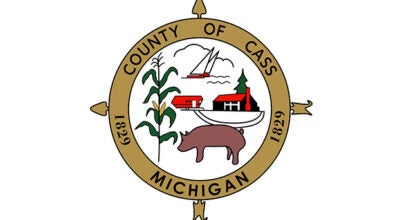Cass moving into eight-county mental health alliance
Published 5:13 pm Monday, June 10, 2013
CASSOPOLIS — Restructuring the public mental health system means Cass County moving from a four-county affiliation with Allegan, Kalamazoo and St. Joseph to an eight-county alignment known as Southwest Michigan Behavioral Health with Barry, Branch, Berrien, Calhoun and Van Buren.
Allegan left this group to join a region with Ottawa, Muskegon and Kent.
Woodlands Behavioral Healthcare Network CEO Kathy Emans advised the Board of Commissioners June 6, “The governance board will be comprised of one CMH (Community Mental Health) board representative from each county of various populations, but we will all have an equal vote. An operating committee comprised of CEOs will advise the region board. That’s very significant to us and was a hard-fought issue.”
“The other part of the change to a regional entity pertains to substance abuse funding,” Emans said. “Currently, mental health funding comes from one place and substance abuse funding comes from another. The mental health code has been revised by a bill to blend them into the new regional entity. Currently, we have two Cass County representatives to the substance abuse advisory council, (County Commissioner Robert Wagel of Wayne Township and Woodlands board Chairman Dale Lowe, a former commissioner who is now Howard Township supervisor). This council will be revised and commissioners will need to appoint a new representative who must be a commissioner. You can add an additional member from the community who can be a member at-large. There can be no more than two per county to maintain equal status. Changes should be done Jan. 1.”
Emans delivered Woodlands’ FY 2012 annual report showing $11,775,293 in revenues and expenditures.
Woodlands, based in Cassopolis, provided services to 1,595 people — a 7.5-percent increase from FY 2011.
Of those 1,595, 44 percent are adults with mental illness, 29 percent are individuals for substance use and abuse, 16 percent children with serious emotional disturbance and 11 percent persons with developmental disabilities.
By ethnicity, 71 percent are white/Caucasian, 10 percent are black/African American, 2 percent are Hispanic and 17 percent are other.
“Overall satisfaction with services, gathered from surveys, was 97 percent,” Emans said. “A key measure of effectiveness is called the Michigan Mission-Based Performance Indicator System. It’s 14 measures. The state compares one county’s community mental health to another. The expectation is 95 percent compliance. A couple that are key for us are timeliness of access. If there is an emergency, we have to be on-site and complete crisis evaluation within three hours. We were at 100 percent (of 37 children and 200 adults). Another important measure talks about the ability to get individuals in to be seen on a timely basis. We were at 98.5 percent (of 372) individuals requesting services receiving an initial assessment within 14 days of their request; 96.5 percent of 281 persons who received an initial assessment started services within 14 days of their assessment.”
Woodlands continues to partner with Cassopolis Family Clinic to provide outpatient therapy options.
In conjunction with medical staff, clinician Tonya Cosey provides behavioral health screening, assessment and treatment to individuals who choose to receive mental health care at their primary care site.
This partnership provides additional options for treatment to individuals deemed ineligible to receive services through Woodlands, Emans said.
In conjunction with the Department of Human Services (DHS), Woodlands began providing trauma-focused screenings to all Cass County children removed from their homes due to abuse or neglect.
“Early intervention produces more positive outcomes,” she said.
Woodlands also works in tandem with Family Treatment Court, Sobriety Court and Borgess-Lee Memorial Hospital in Dowagiac.






